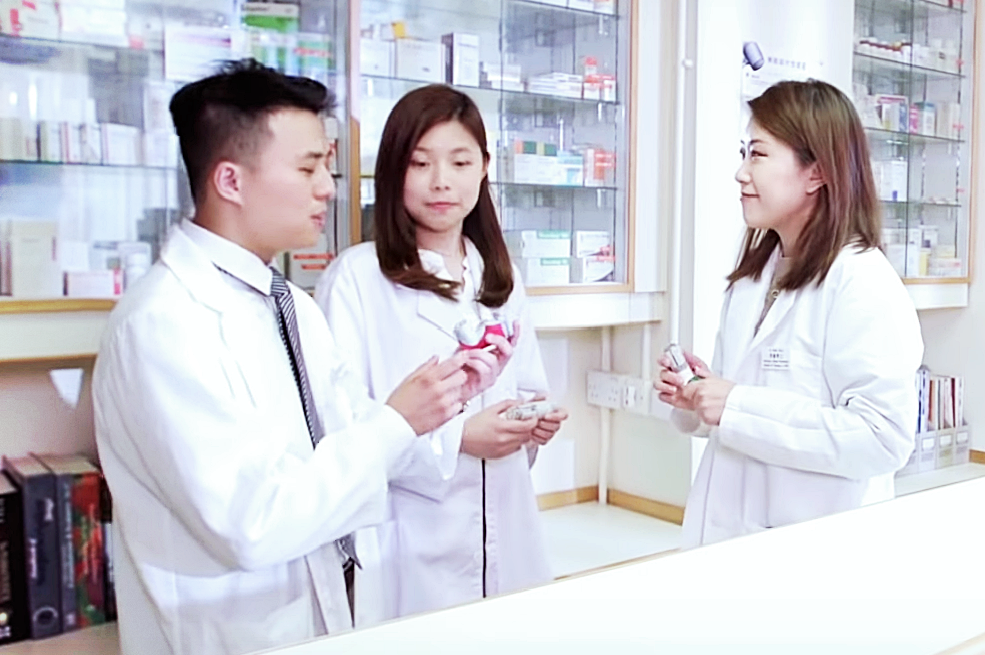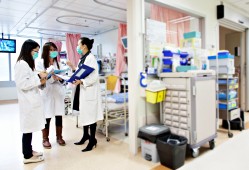Introduction
Master of Clinical Pharmacy Programme (MCP)
The programme was designed to equip pharmacists with knowledge and skills to perform patient-oriented pharmaceutical care that targets specific patient needs. It foster the ability in developing pharmacy service that promotes population-based health and enhance medication use.
Objectives
- To equip pharmacists with knowledge and skills to perform patient-oriented pharmaceutical care that targets specific patient needs
- To foster the ability in developing pharmacy service that promotes population-based health and enhance medication use
Programme Design
- 2-year part-time taught Master degree programme.
- Students may complete the programme in 2 years on normal progress, or up to 4 years the maximum.
Students will learn from teachers from the School of Pharmacy, as well as expert physicians, pharmacists and other healthcare professionals from local clinical practice. - The programme will involve a variety of learning activities, including:
- Case studies
- Lectures
- Physician-guided ward rounds
- Presentations
- Seminars
- Workshops
Tuition Fee
- Please refer to Graduate School webpage for information
Programme Director
- Dr. ZHOU Rui, Keary
WHY choosing the CUHK Master of Clinical Pharmacy (MCP) programme?
- Various learning activities including lectures, case studies, physician-guided ward rounds, seminars, etc. adopted.
- Case-oriented teaching method applied in most modules.
- Co-teach by experienced lecturers, expert physicians, administrators and pharmacists from local clinical practice; sufficient opportunities for networking.
- Interactive & supportive learning environment allowing instant feedback from lecturers.
Programme Requirements
Period of Study
Part-time : 2 years (maximum 4 years)
Study Scheme
- A total of 30 units course work is required for graduation.
- Courses can be taken in any term sequence unless specified.
- Some courses have pre-requisite, see the ‘Course List & Description’ section.
Class Schedule
- Tuesday evenings (6:30pm-9:30pm) & Saturday afternoons (2:30pm-6:30pm) during academic terms.
Course List & Description
| Code | Course Title | Unit |
| PHAR 5820 | Clinical Pharmacy Service Development >> This course introduces the basic elements in developing clinical pharmacy service in community and hospital pharmacy practice settings. 臨牀藥劑服務拓展 本科旨在介紹拓展臨床藥劑服務的基本元素,以及在不同類型的藥劑服務執業環境之中應用。 << |
1.5 |
| PHAR 5823 | Graduation Project Preparation >> This course will review the principle of research design and method essential for the preparation and planning of graduation project. Students will take PHAR 5824 in the following semester which requires the submission of a project proposal. The proposal shall demonstrate pharmacists’ impact on patient care, teaching, pharmaceutical research and development or administrative management. 畢業專題研究預備 本科旨在教授研究項目的設計和方法之規範。在下一學期 ,學生將會修讀PHAR5824,參與策劃專題研究和提交研究計劃書。學生須在專題研究計劃書演示藥劑師在病人護理、藥物研究及發展或相關之行政處理上的影響。 << |
0 |
| PHAR 5824 | Graduation Project I >> In this course, students are required to submit a project proposal that demonstrates pharmacists’ impact on patient care, teaching, pharmaceutical research and development or administrative management. 畢業專題研究一 修讀本科的學生須參與策劃專題研究和提交研究計劃書。專題研究計劃書要求學生演示藥劑師在病人護理、藥物研究及發展或相關之行政處理上的影響。 << |
2 |
| PHAR 5825 | Pharmacokinetics and Pharmacogenetics >> This course provides students with an understanding of applying pharmacokinetics & pharmacogenetics in pharmacy practice. Principles of Pharmacokinetics, pharmacogenetics and therapeutic monitoring will be discussed. Case examples on specific drugs will be illustrated. 藥物代謝動力學及藥物遺傳學 本科教授藥物代謝動力學和藥物遺傳學在藥劑執業環境之應用。本科會討論藥物代謝動力學、藥物遺傳學和藥物監控的主旨, 亦會說明及討論相關的個案。 << |
1 |
| PHAR 5830 | Communication Workshop >> This course aims to enhance students’ skills in interacting with other health care professionals and patients. Skills in counseling patients, handling potential conflicts and approaching physicians will be illustrated. Language of instruction: English and Cantonese. 溝通技巧工作坊 本科旨在提升學生與醫護人員和病人溝通的技巧。本科將講授藥物輔導、處理潛在衝突及與醫生溝通的技巧。 << |
1 |
| PHAR 5851 |
Pharmacoeconomics >> This course will provide lectures and practical sessions on the assessment of cost effectiveness of drugs by utilizing various pharmacoeconomics analyses and techniques. 藥物經濟學 本科教授學生如何運用藥物經濟學各種分析方法和技巧,以評估藥物治療的成本效益。 << |
3 |
| PHAR 5852 | Pharmacovigilance and Public Health for Pharmacists >> In contemporary practice, pharmacists are taking a leading role in pharmacovigilance strategies that aim to promote the effective and safe use of medicines. The ultimate goal is to improve individual and public health. This course will expand student’s knowledge of principles and practices of public health and pharmacovigilance. Key public health principles, health economics, epidemiology, adverse reactions monitoring & various quality assurance measures will be covered in this course. 藥物警戒及公共衛生 在近代執業中, 藥劑師領導藥物警戒策劃,以達到促進有效和安全使用藥物的效果,最終目標是改善個人和公眾健康。本課程將擴闊學生對公共健康原則和藥物警戒的知識。課程將覆蓋公共衛生原則, 衛生經濟學,流行病學,不良反應監測及各種質量保證措施。 << |
1 |
| PHAR 5880 | Drug Therapy Assessment and Drug Information >> This course aims to enhance student’s ability on conducting drug therapy assessment and applying drug information in pharmaceutical care. Students will learn the systematic approach for evaluating, recommending and monitoring patient-specific drug therapy. It will also teach students how to locate and appraise various types of drug information resources and interpret medical literature. This course is intended for students who plan to take Pharmacotherapy courses (PHAR 5881 to 5888) in the concurrent term or future terms. 藥物治療評估及藥物資訊 本科旨在提升學生對藥物治療評估和藥物資訊的認知及應用能力。學生會學習到如何有系統地評估、建議及監控為病人特定的藥物治療方案。本科亦會教授學生如何尋找不同類型的藥物資訊,作出評估和詮釋醫學文獻。本科是專為計劃在同一學期或將來學期修讀藥物治療學系列的學生而設的。 << |
2 |
| PHAR 5882 |
Pharmacotherapy: Infectious Diseases >> This course provides students with in-depth therapeutic knowledge on infectious diseases. Treatment guidelines and considerations in therapy selection will be discussed. Emphasis will be placed on addressing therapy-related issues with the knowledge acquired.藥物治療學: 傳染病篇 本科教授學生深入的傳染病藥物治療知識,並會探討治療指標方針及選擇藥物時的考慮因素。課程尤其著重教授學生如何運用所學到的知識來處理有關治療的問題。 << |
2 |
| PHAR 5884 | Pharmacotherapy: Respiratory and Dermatologic Disorders >> This course provides students with in-depth therapeutic knowledge on respiratory and dermatologic disorders. Treatment guidelines and considerations in therapy selection will be discussed. Emphasis will be placed on solving therapy-related problems with the knowledge acquired.
藥物治療學: 呼吸系統疾病及皮膚病篇 << |
2 |
| PHAR 5885 | Pharmacotherapy: Psychiatric Disorders >> This course provides students with in-depth therapeutic knowledge on psychiatric disorders. Treatment guidelines and considerations in therapy selection will be discussed. Emphasis will be placed on solving therapy-related problems with the knowledge acquired.
藥物治療學: 精神病篇 << |
2 |
| PHAR 5886 | Pharmacotherapy: Diabetes and Renal Disorders >> This course provides students with in-depth therapeutic knowledge on diabetes and renal disorders. Treatment guidelines and considerations in therapy selection will be discussed. Emphasis will be placed on solving therapy-related problems with the knowledge acquired.
藥物治療學: 糖尿病及腎病篇 << |
2 |
| PHAR 5887 | Pharmacotherapy: Gastrointestinal and Rheumatologic Disorders >> This course provides students with in-depth therapeutic knowledge on gastrointestinal, hepatic and rheumatologic disorders. Treatment guidelines and considerations in therapy selection will be discussed. Emphasis will be placed on solving therapy-related problems with the knowledge acquired.
藥物治療學: 腸胃病及關節病篇 << |
3 |
| PHAR 5888 | Pharmacotherapy: Neurologic and Pediatrics Disorders >> This course provides students with therapeutic knowledge on neurologic and pediatric disorders. Treatment guidelines and considerations in therapy selection will be discussed. Emphasis will be placed on solving therapy-related problems with the knowledge acquired.
藥物治療學: 神經系統疾病及兒科病篇 << |
2.5 |
| PHAR 5889 | Pharmacotherapy: Pharmaceutical Care in Geriatrics >> This course aims to teach students drug therapy principles for older adults and common drug related problems encountered when caring for older adults. Students will participate in the delivery of care and services to elderly patients in various settings.
藥物治療學: 老人科篇 << |
2.5 |
| PHAR 5890 | Pharmacotherapy: Cardiovascular Disorders >> This course provides students with in-depth therapeutic knowledge on cardiovascular disorders. Treatment guidelines and considerations in therapy selection will be discussed. Emphasis will be placed on solving therapy-related problems with the knowledge acquired.
藥物治療:心血管病 << |
2 |
| PHAR 5891 | Pharmacotherapy: Oncologic and Haematologic Disorders >> This course provides students with therapeutic knowledge on oncologic and haematologic disorders. Treatment guidelines and considerations in therapy selection will be discussed. Emphasis will be placed on solving therapy-related problems with the knowledge acquired.
藥物治療: 癌症及血科病篇 << |
2 |
| PHAR 5892 | Pharmacotherapy: Critical Care & Emergency Medicine >> This course provides students with therapeutic knowledge on critical care & emergency medicine. Treatment guidelines and considerations in therapy selection will be discussed. Emphasis will be placed on solving therapy-related problems with the knowledge acquired.
藥物治療: 深切治療和急症醫學篇 << |
2.5 |
| PHAR 5924 | Graduation Project II >> This course consists of independent and teamwork with supervision. Students are required to implement a predetermined practice-based project of interest in their work settings. The project should demonstrate pharmacists’ impact on patient care, pharmaceutical research and development or administrative management. Students are expected to be involved in project implementation, outcome measurement, result analysis, report writing and presentation. Pre-requisite: PHAR 5824.
畢業專題研究二 << |
5 |
Admission Requirements & Application
Admission Requirements
- Meet the general admission requirements of the Graduate School, including the English Language Proficiency Requirement; and
- Hold a Bachelor of Pharmacy degree and registered as a pharmacist.
Application Method
Applicants should complete both Step 1 and 2.
- Step 1
Apply online through the Graduate School Website - Step 2
Mail the hardcopies of the supporting documents to the School of Pharmacy. Please quote “Application to MCP” and your online application number on the envelope. Supporting documents required for the application are listed on the Graduate School Website.
The programme application is open every year around December.
Please refer to Graduate School for additional information.
Application Deadline
- 31 March of each year for non-local applicants (i.e. applicants without Right of Abode in Hong Kong )
- 31 May of each year for local applicants
Applications received after deadline will only be considered if vacancy allowed.
Contact
| Please feel free to contact us for further enquiry about the programme. | |
|
Address:
|
School of Pharmacy 8th Floor, Lo Kwee-Seong Integrated Biomedical Sciences Building Area 39, The Chinese University of Hong Kong Shatin, N.T., Hong Kong |
|
Tel:
|
3943-6862 |
|
Fax:
|
2603-5295 |
|
Email:
|
pharmacy@cuhk.edu.hk |
Alumni Sharing
Feedback from MCP Students
- “Very informative and practical.”

- “I deepened my interest in the subject matter of this course.”
- “Need more time for case discussion.”
- “Good to be able to look at the patient chart and gain understanding.”
- “It would be appreciated if more lectures from doctors/guest speakers, ie. First half of lecture: professors from School of Pharmacy on pharmacist aspect; latter half: doctors on clinical aspect.”
- “Ward rounds and case sharing are helpful.”
- “Case discussions were good.”
- “More reading material should be provided.”
![feedback3[1]](http://www.pharmacy.cuhk.edu.hk/1/wp-content/uploads/2016/05/feedback31.jpg)
- “Case discussion and presentation are quite useful for self-learning and critical thinking.”
- “Lectures are organized; all instructors showed expertise on the subject they taught.”
- “Visiting to Prince of Wales Hospital and round with physicians were valuable.”
- “I’ve gained better understanding of drug therapy.”
- “Materials of this course are very practical and related to my daily job in pharmacy.”
Our program strives for continuous improvement, constructive comments received are considered for future enhancement of the programme.
Source: Course evaluation, year 2005 – 2006


